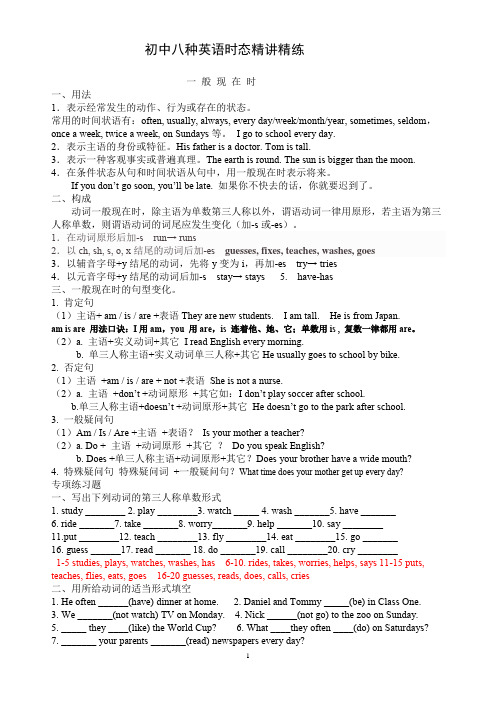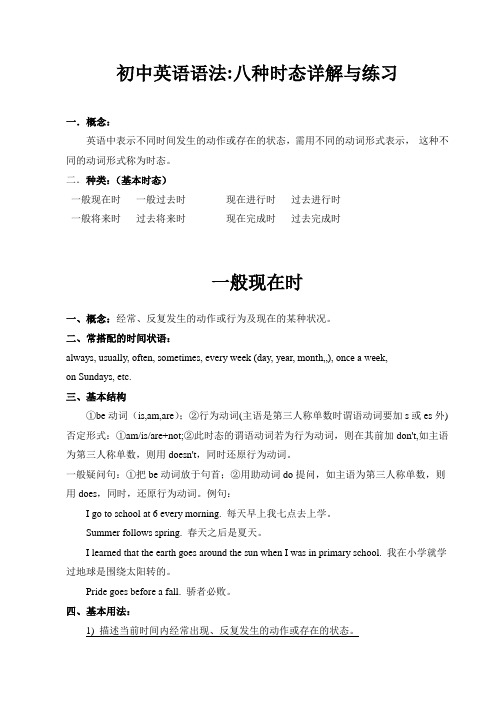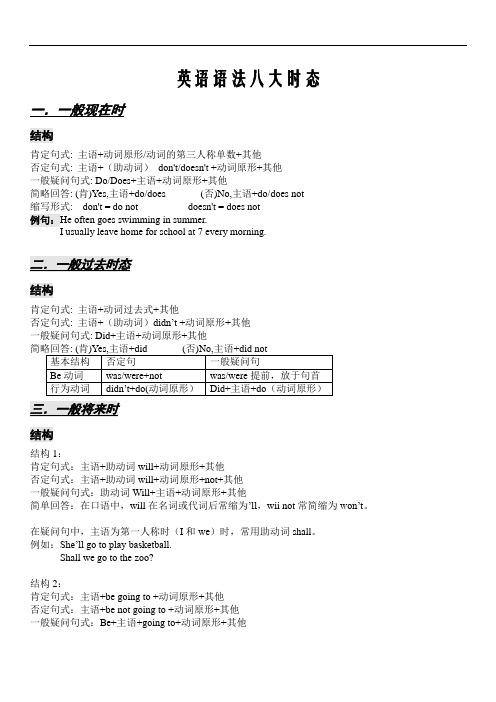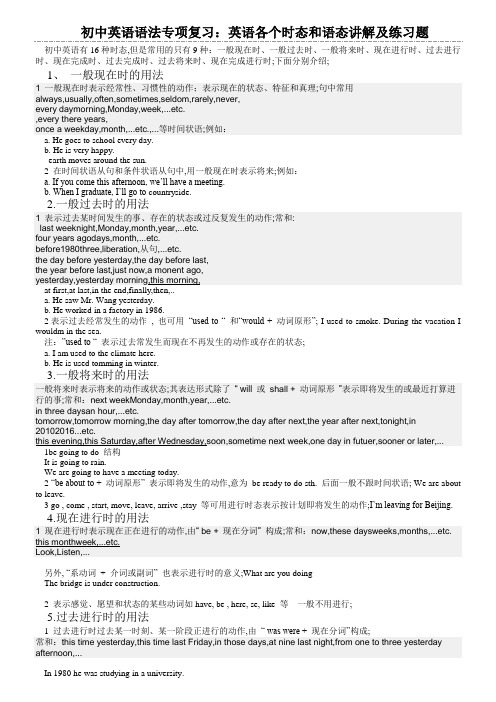初中英语语法:动词时态讲解及练习
初中八种英语时态精讲精练(含答案)

初中八种英语时态精讲精练一般现在时一、用法1.表示经常发生的动作、行为或存在的状态。
常用的时间状语有:often, usually, always, every day/week/month/year, sometimes, seldom,once a week, twice a week, on Sundays等。
I go to school every day.2.表示主语的身份或特征。
His father is a doctor. Tom is tall.3.表示一种客观事实或普遍真理。
The earth is round. The sun is bigger than the moon. 4.在条件状态从句和时间状语从句中,用一般现在时表示将来。
If you don’t go soon, you’ll be late. 如果你不快去的话,你就要迟到了。
二、构成动词一般现在时,除主语为单数第三人称以外,谓语动词一律用原形,若主语为第三人称单数,则谓语动词的词尾应发生变化(加-s或-es)。
1.在动词原形后加-s run→ runs2.以ch, sh, s, o, x结尾的动词后加-es guesses, fixes, teaches, washes, goes3.以辅音字母+y结尾的动词,先将y变为i,再加-es try→ tries4.以元音字母+y结尾的动词后加-s stay→ stays 5. have-has三、一般现在时的句型变化。
1. 肯定句(1)主语+ am / is / are +表语They are new students. I am tall. He is from Japan.am is are 用法口诀:I用am,you 用are,is 连着他、她、它;单数用is , 复数一律都用are。
(2)a. 主语+实义动词+其它I read English every morning.b. 单三人称主语+实义动词单三人称+其它He usually goes to school by bike.2. 否定句(1)主语+am / is / are + not +表语She is not a nurse.(2)a. 主语+don’t +动词原形+其它如:I don’t pla y soccer after school.b.单三人称主语+doesn’t +动词原形+其它He doesn’t go to the park after school.3. 一般疑问句(1)Am / Is / Are +主语+表语?Is your mother a teacher?(2)a. Do + 主语+动词原形+其它?Do you speak English?b. Does +单三人称主语+动词原形+其它?Does your brother have a wide mouth?4. 特殊疑问句特殊疑问词+一般疑问句?What time does your mother get up every day?专项练习题一、写出下列动词的第三人称单数形式1. study ________2. play ________3. watch _____4. wash _______5. have _______6. ride _______7. take _______8. worry_______9. help _______10. say ________11.put ________12. teach ________13. fly ________14. eat ________15. go _______16. guess ______17. read _______ 18. do _______19. call ________20. cry ________1-5 studies, plays, watches, washes, has 6-10. rides, takes, worries, helps, says 11-15 puts, teaches, flies, eats, goes 16-20 guesses, reads, does, calls, cries二、用所给动词的适当形式填空1. He often ______(have) dinner at home.2. Daniel and Tommy _____(be) in Class One.3. We _______(not watch) TV on Monday.4. Nick ______(not go) to the zoo on Sunday.5. _____ they ____(like) the World Cup?6. What ____they often ____(do) on Saturdays?7. _______ your parents _______(read) newspapers every day?8. The girl _______(teach) us English on Sundays.9. She and I ________(take) a walk together every evening.10. The moon ________ (travel) round the earth.11. It usually ________ (take) me more than two hours to finish my homework.12. I will tell him the good news as soon as he ________ (come) back.13. Miss Gao is very busy. She ________ (sleep) six hours a day.14. Look! Susan ________ (dance) in the garden. She often ________ (dance) there.15. The children will go to the Summer Palace if it ________ (not rain) tomorrow.16. I _________ any pears (not have). But Mary _________ some (have).17. What language ____ you _____? (speak) 18. My brother _____ to be a scientist. (not like) 19. We ______ Japanese at school. (not study) 20. He _____ playing football. (not like)1. has2. are3. don’t have4. doesn’t go5. Do like6. do, do7. Do, read8. teaches9. take 10. travels 11. takes 12. comes 13. sleeps 14. is dancing, dances 15. doesn’t rain 16. don’t have, has 17. do, speak 18. doesn’t like 19. don’t study 20. doesn’t like三、按照要求改写句子1. Daniel watches TV every evening.(改为否定句)_________________________2. I do my homework every day.(改为一般疑问句,并作肯、否定回答)________________________________________________________3. Amy likes playing computer games.(改为一般疑问句,并作肯、否定回答)___________________________________________________4. We go to school every morning.(改为否定句)____________________________5. Sun Yang usually washes some clothes on Saturday.否定句: _____________ 一般疑问句: ________________ 划线提问: ____________6. Tom does his homework at home.否定句: ______________ 一般疑问句: ____________ 划线提问_____________1. Daniel doesn’t watch TV every evening.2. Do you do your homework every day? Yes, I do. No, I don’t.3. Does Amy like playing computer games? Yes, she does. No, she doesn’t.4. We don’t go to school every morning.5. Sun Yang doesn’t usually wash any clothes on Saturday. Does Sun Yang usually wash any clothes on Saturday? What does Sun Yang usually do on Saturday?6. Tom doesn’t do his homework at home. Does Tom do his homework at home? Where does Tom do his homework?四、选用所给的词语适当形式填空give, rain, enjoy, sing, return, borrow, keep1. It often ______ in my hometown in summer.2. Sometimes the birds _______ in the tree.3. Joe usually ____ books from the school library, but she never _____ them on time.4. May I ________ the dictionary for a week?5. The little boy ________ himself in the garden on Saturdays.6. Mary is a good girl. She often ________ me a hand when I need some help.1. rains2. sing3. borrows, returns4. keep5. enjoys6. gives一般过去时的用法一、定义:表示过去某一时间所发生的动作或存在的状态;表示在过去一段时间内,经常性或习惯性的动作。
(word完整版)初中英语时态讲解及练习(含答案),推荐文档

时态1. 一般现在时●形式:do does(单数第三人称)●意义:一般现在时表示客观的、普遍性的真理以及经常性的事件。
●用法:A) 表示现在发生的动作、情况、状态和特征。
B) 经常性、习惯性动作。
e.g.:He always helps others. (他总是帮助别人。
)He often goes to the gym.C) 客观事实和普遍真理。
尤其要注意,如果前后文不是一般现在时,则无法保持主句、从句时态一致。
e.g.: The sun rises in the east and sets in the west.Knowledge is power.●这一用法场合一些表动作频率的时间副词连用:1). 表示肯定的频率副词:always, frequently, usually, sometimes, generally, occasionally, often etc.2). 表示否定的频率副词:never, seldom, rarely etc.➢这些副词的位置:在Be动词后,实义动词前。
e.g. He is always late.2. 一般过去时●形式:did●意义:一般过去时表示在过去的某一特定时间发生和结束的活动或情况。
●用法:A) 表示过去某个时间发生的动作或情况。
e.g.: I saw him in the library yesterday morning. (有特定的时间状语)➢yesterday, yesterday evening, last night/month/spring/year, the night before last(前天晚上),three days/months/years ago, in 1999 etc.。
这些时间状语之前不用加介词。
B) 表示过去习惯性动作,一直持续或反复发生的动作,此时可与表示拼读的时间副词连用。
e.g.: I slept for eight hours last night. (表示在过去某一段时间内持续的动作,但这动作现在已经结束了)3. 一般将来时●形式:will/shall do或be going to do●意义:一般将来时表示在未来的某个时间将要发生的某个动作或状态。
初中英语语法-八种时态详解与练习

初中英语语法:八种时态详解与练习一.概念:英语中表示不同时间发生的动作或存在的状态,需用不同的动词形式表示,这种不同的动词形式称为时态。
二.种类:(基本时态)一般现在时一般过去时现在进行时过去进行时一般将来时过去将来时现在完成时过去完成时一般现在时一、概念:经常、反复发生的动作或行为及现在的某种状况。
二、常搭配的时间状语:always, usually, often, sometimes, every week (day, year, month…), once a week,on Sundays, etc.三、基本结构①be动词(is,am,are);②行为动词(主语是第三人称单数时谓语动词要加s或es外) 否定形式:①am/is/are+not;②此时态的谓语动词若为行为动词,则在其前加don't,如主语为第三人称单数,则用doesn't,同时还原行为动词。
一般疑问句:①把be动词放于句首;②用助动词do提问,如主语为第三人称单数,则用does,同时,还原行为动词。
例句:I go to school at 6 every morning. 每天早上我七点去上学。
Summer follows spring. 春天之后是夏天。
I learned that the earth goes around the sun when I was in primary school. 我在小学就学过地球是围绕太阳转的。
Pride goes before a fall. 骄者必败。
四、基本用法:1) 描述当前时间内经常出现、反复发生的动作或存在的状态。
在这种情景中,句子常带有表示频率的时间状语:always , everyday , often , once a week (month , year , etc.) , sometimes , seldom , usually等等,以表示句中的动作或状态是习惯性的、经常性的。
初中英语时态讲解及练习(全)

时间状语:Tomorrow, next day(week, month, year…),soon, in a few minutes, by…,the day after tomorrow, etc.
否定形式:主语+am/is/are not going to do ; 主语+will/shall not do+其他 一般疑问句:be放于句首;will/shall提到句首。
1.I ____(write, am writing, is writing, are writing) a letter now. 2.Look, it _____(begin, is beginning, am beginning, are beginning) to rain. 3.They ____(study, is studying, am studying, are studying) medicine at the Medical Institute of Chengde these days. 4.He _____(teach, am teaching, is teaching, are teaching) an English lesson at this time.
谓语动词使用过去式形式, 加ed,分为规则和不规则变 化。表示过去经常发生的动 作,也可用“used to do ” 和“would +动词原形”。
1. He____(be, was, were, been) here a moment ago. 2. They ____(be, was, were, been) here just now. 3. The scientists _____(leave, leaves, leaved, left) for America yesterday. 4. Last week we ______(visit, visited ) the Science Museum. 5. When I was a child, I often ____(play, played) football. 6. The students ran out of the classroom as soon as the bell ____(ring, rang, rung).
(英语)初中英语动词的时态技巧和方法完整版及练习题及解析

据后面的句子判断,对于坐在身边表示介意,故答案为
C。
13. —Will Sally come here tomorrow?
— I don ’ t know if she_______ here tomorrow. If she _______ here, I will tell you.
A. comes; comes
B. will come; comes C. comes; will come D. will come; will come
【答案】 B
【解析】
【详解】
句意: -Sally 明天会到这儿来吗? -我不知道她明天是否来这儿,如果她来的话,我会告诉
你的。 comes 来,动词的第三人称单数形式; will come 将会来,一般将来时态。根据句意
明年,用于一般将来时,可排除 C 项。根据句意结构和语境,可知选 B。
7.---Helen, When did you moved here? ---I______ here since two years ago.
A. moved 【答案】 D 【解析】
B. lived
C. have moved
D. have lived
【解析】句意:你介意我坐在你旁边吗,先生?
——对不起,我确实介意,我习惯了独自
坐着欣赏音乐。 mind doing sth.介意做某事, doing 前面可以用形容词性物主代词或代词的
宾格,首先排除 B,D; used to do 过去常常做某事, be used to doing sth.习惯于做某事,根
(英语)初中英语动词的时态技巧和方法完整版及练习题及解析
一、初中英语动词的时态
1.Alice, together with her classmates punished for breaking the school rules last week.
初中英语语法八大时态总结及练习题

英语语法八大时态一.一般现在时结构肯定句式: 主语+动词原形/动词的第三人称单数+其他否定句式: 主语+(助动词)don't/doesn't +动词原形+其他一般疑问句式: Do/Does+主语+动词原形+其他简略回答: (肯)Yes,主语+do/does (否)No,主语+do/does not缩写形式: don't = do not doesn't = does not例句:He often goes swimming in summer.I usually leave home for school at 7 every morning.二.一般过去时态结构肯定句式: 主语+动词过去式+其他否定句式: 主语+(助动词)didn’t +动词原形+其他一般疑问句式: Did+主语+动词原形+其他基本结构否定句一般疑问句Be动词was/were+not was/were提前,放于句首行为动词didn’t+do(动词原形)Did+主语+do(动词原形)三.一般将来时结构结构1:肯定句式:主语+助动词will+动词原形+其他否定句式:主语+助动词will+动词原形+not+其他一般疑问句式:助动词Will+主语+动词原形+其他简单回答:在口语中,will在名词或代词后常缩为’ll,wii not常简缩为won’t。
在疑问句中,主语为第一人称时(I和we)时,常用助动词shall。
例如:She’ll go to play basketball.Shall we go to the zoo?结构2:肯定句式:主语+be going to +动词原形+其他否定句式:主语+be not going to +动词原形+其他一般疑问句式:Be+主语+going to+动词原形+其他简略回答:(肯)Yes,主语+be (否)No,主语+be not将来时其他表示法1)be going to表示将来表示说话人的打算、计划、安排或根据迹象判断必然或很可能发生的事情。
初中英语语法专项复习英语动词时态和语态讲解和练习题

初中英语语法专项复习:英语各个时态和语态讲解及练习题初中英语有16种时态,但是常用的只有9种:一般现在时、一般过去时、一般将来时、现在进行时、过去进行时、现在完成时、过去完成时、过去将来时、现在完成进行时;下面分别介绍;1、一般现在时的用法1 一般现在时表示经常性、习惯性的动作;表示现在的状态、特征和真理;句中常用always,usually,often,sometimes,seldom,rarely,never,every daymorning,Monday,week,...etc.,every there years,once a weekday,month,...etc.,...等时间状语;例如:a. He goes to school every day.b. He is very happy.earth moves around the sun.2 在时间状语从句和条件状语从句中,用一般现在时表示将来;例如:a. If you come this afternoon, we’ll have a meeting.b. When I graduate, I’ll go to countryside.2.一般过去时的用法1 表示过去某时间发生的事、存在的状态或过反复发生的动作;常和:last weeknight,Monday,month,year,...etc.four years agodays,month,...etc.before1980three,liberation,从句,...etc.the day before yesterday,the day before last,the year before last,just now,a monent ago,yesterday,yesterday morning,this morning,at first,at last,in the end,finally,then,..a. He saw Mr. Wang yesterday.b. He worked in a factory in 1986.2表示过去经常发生的动作, 也可用“used to “ 和“would + 动词原形”; I used to smoke. During the vacation I wouldm in the sea.注:”used to “ 表示过去常发生而现在不再发生的动作或存在的状态;a. I am used to the climate here.b. He is used tomming in winter.3.一般将来时的用法一般将来时表示将来的动作或状态;其表达形式除了“ will 或shall + 动词原形”表示即将发生的或最近打算进行的事;常和:next weekMonday,month,year,...etc.in three daysan hour,...etc.tomorrow,tomorrow morning,the day after tomorrow,the day after next,the year after next,tonight,in 20102016...etc.this evening,this Saturday,after Wednesday,soon,sometime next week,one day in futuer,sooner or later,...1be going to do 结构It is going to rain.We are going to have a meeting today.2 “be about to + 动词原形” 表示即将发生的动作,意为be ready to do sth. 后面一般不跟时间状语; We are about to leave.3 go , come , start, move, leave, arrive ,stay 等可用进行时态表示按计划即将发生的动作;I’m leaving for Beijing.4.现在进行时的用法1 现在进行时表示现在正在进行的动作,由“ be + 现在分词” 构成;常和:now,these daysweeks,months,...etc. this monthweek,...etc.Look,Listen,...另外, “系动词+ 介词或副词” 也表示进行时的意义;What are you doingThe bridge is under construction.2 表示感觉、愿望和状态的某些动词如have, be , here, se, like 等一般不用进行;5.过去进行时的用法1 过去进行时过去某一时刻、某一阶段正进行的动作,由“ was were + 现在分词”构成;常和:this time yesterday,this time last Friday,in those days,at nine last night,from one to three yesterday afternoon,...In 1980 he was studying in a university.He was reading a novel when I came in.6.现在完成时的用法现在完成时由“have/has + 过去分词.其使用有两种情况:1 现在完成时所表示的动作在说话之前已完成,但对现在有影响;句中没有具体时间状语;常和:just,alreadly,yet,never,ever,now,before,this week,today,these days,once,twice,three times,...He has gone to Fuzhou.He has been to Fuzhou.2 现在完成时所表示的动作开始于过去,持续到现在,也许还会持续下去常用for 和since表示一段时间的状语或since then1949,last Monday,two o'clock,从句...,etc.,ever since then,for three daysa long time,two hours,...etc.so far , now, today, this wek month, year 等表示包括现在内的状语;He has studied English for 5 years.He has studied English since 1985.Now I have finished the work..注意:表示短暂时间动作的词如come, go , die, marry, buy 等的完成时不能与for, since 等表示一般时间的词连用;正确:I have bought the book already.错误:I have bought the book for two years.改:I have had the bookl for two years.7.过去完成时的用法1 过去完成时由“had + 过去分词”构成;过去完成时的动作表示过去某一时刻或某一时刻或某一动作之前完成的动作或状态;句中常用by then1977,yesterday,eight last night,the time we got there,...etc.by the end of last termweek,year,month,...etc..by, before, until, when 等词引导的时间状语;By the end of last year we had built five new houses.I had learnt 5000 words before I entered the university.2过去完成时的动词还可表示过去某一时刻之前发生的动作或状态持续到过去某个时间或持续下去;Before he slept, he had worked for 12 hours.8.过去将来时的用法过去将来时表示从过去的某个时间看来将要发生的动作或存在的状态;过去将来时由“should 或would + 动词原形” 构成;第一人称用should, 其他人称用would. ;常和:They were sure that they would succeed.二动词语态1.当句子的主语是动作的执行者时, 谓语的形式叫主动语态;句子的主语是动作承受者时,谓语的形式叫被动作语态;被动语态由助动词be + 过去分词构成,时态通过be 表现出来;1 一般现在时:You are required to do this.2 一般过去时:The story was told by her.3 一般将来时:The problem will be discussed tomorrow.4 现在进行时:The road is being widened.5 过去进行时:The new tool was being made.6 现在完成时:The novel has been read.7 过去完成时:He said that the work had been finished.8 过去将来时:He said that the trees would be planted soon.2. 一些特殊的被动结构1 带情态动词的被动结构:The problem must be solved soon.2 带不定式的被动结构:The room is going to be painted.The homework needs to be done with care.3 短语动词的被动:a.不及物动词+介词:若这类短语动词是及物性的,则可用于被动语态中,如:laugh at, look after, talk about, think of 等;若这类短语动词是不及物性的则不可用于被动语态中,如:book up, look down. 等b.及物动词+副词:bring about, carry out, find out, make out, put away, put off, take up, turn down, turn out, wipe out 等c. 动词+副词+介词:do away with, face up to, give into ,look down upon, make up with等d. 动词+名词+介词:catch sight of, keep on eye on, make a fool of , pay attention to , put an end to , set fire/light to , take notice of 等4 带复合宾语的动词在改为被动语态时,一般把主动结构中的宾语改为主语,宾语补足语保留在谓语后面;We always keep the classroom clean.比较:The classroom is always kept clean.5主动形式表示被动意义的词;常见的有:a.主动形式,这时动名词同句中的主语有动宾关系;The children need looking after.The windows wants /requires repairing.This point deserves mentioning.练习题1. It is a fine day. The sun __________shine brightly.2. They ___________visit the Science Museum next Sunday.3. Mr Brown________live in Beijing since he came to China.4. Mr Wang ________teach us English two years ago.5. The Smiths _______________ watch TV at this time last night.6. We __________learn about ten English songs by the end of last term.7. Father said that he ____________buy a new bike for me the next Friday.8. Bill isn¡¯t here. He ___________chat with his friends in the classroom.9. The teacher said that the moon __________go round the earth.10. The Young Pioneers will go to the zoo if it ____________not rain this Sunday.11. Listen They __________talk about the new film.12. Jim asked us what ___________happen in China in 1976.13. My mobile phone ___________steal on a bus last week.14. The host ____________interview the little boy just now.15. The Greens __________watch TV now.16. He said that he _____________ring me up when he got there.17. We ____________learn English for about three years.18. My brother_____________join the League in 1997.19. The farmers __________pick apples when I saw them.20. The red skirt __________cost the girl forty yuan.21. The film ____________begin when I got to the cinema.22. The girl told me that she wanted to be an English teacher when she _____grow up.23. My sister is a student and she _____________study at a middle school nearby.24. Mr Green __________travel to several places in South China since he came here.25. You _________catch the early bus if you get up early.26. _______you been________wear glasses all the time27. I’ll go home as soon as I _______finish my homework.29. Most science books are ______write in English.30. I ____________stay there for two months last year.31. Tell Lily to call me as soon as she _______.A. will arriveB. gets thereC. has goneD. reach here32. ----Hi, Kate. You look tired. What’s the matter ----I ______ well last night.A. didn’t sleepB. don’t sleepC. haven’t sleptD. won’t sleep33. ----Excuse me, look at the sign over there, please. Could you stop smoking----Sorry, I ____ that.A. didn’t seeB. don’t seeC. won’t seeD. can’t see34. ----Well, I found this. I think it must be yours. ----My watch Thank you. Where _____itA. do you findB. had you foundC. were you findingD. did you find35. ----Don you know when Dr White ____ for dinner this evening----No, but I think he ____ when he is free.A. will come; comesB. will come; will comeC. comes; comesD. comes; will come36. Look at those black clouds. It _____ rain. Let’s hurry. A. maybe B. would C. has D. is going to37. ----Jimmy is leaving for a holiday. ----Really Where ____ he ____A. has; goneB. will; goC. did; goD. does; go38. ----Shall we go shopping now ---Sorry, I can't. I ____ my shirts.A. washB. washesC. washedD. am washing39. ----I called you yesterday evening, but there was no answer.----Oh, I am sorry. I ___ dinner at my friend's home.A. haveB. hadC. was havingD. have had40. The Oriental Pearl TV Tower ____ thousands of visitors since 1995.A. attractedB. attractsC. has attractedD. will attract46. ----Why didn't you go to the cinema yesterday -----Because I ____ the film before.A. had seenB. have seenC. have watchedD. has watched47. I don't think John saw me. He ____ a book at that moment.A. just readB. has just readC. was just readingD. had just read48. Mr Smith ____ a book about China last year but I don't know whether he has finished it.A. has writtenB. wroteC. had writtenD. was writing49. Mr White ____ the newspaper while his daughter ____TV.A. has read; was watchingB. was reading; watchedC. was reading; was watchingD. reading; watched50. ---- I ____ you at the meeting. Why ----I was ill. A. saw B. have seen C. not see D. didn't see51. The 29th Olympic Games ____ in Beijing in 2008. A. hold B. will hold C. will be held D. held52. Hurry up The play ____ for ten minutes. A. has been on B. has begun C. had begun D. began53. ----May I speak to Mr Smith ----Sorry, he ____ Australia. But he ____ in two days.A. has been to; will come backB. has gone to; will be backC. has been in; would come backD. is leaving for; doesn't come back54. I can't go to the theater tonight because I ____ my ticket.A. have lostB. had lostC. will loseD. was losing55. ----What a nice bike How long ____ you ____ it ----Just two weeks.A. have; boughtB. did; buyC. have; hadD. are; having56. ----I'm sorry to have kept you waiting. ----Oh, not at all. I ____ here only for a few minutes.A. have comeB. had beenC. wasD. have been57. ----____ my dictionary anywhere ---- Yes. I saw it on your desk a moment ago.A. Did you seeB. If you seeC. Had you seenD. Would you see58. We were all surprised when he mad it clear that he ____ office soon.A. leavesB. would leaveC. will leaveD. had left答案:I. 1. shines/ is shining 2. are going to/ will visit 3. has lived 4. taught5. were watching6. had learned7. would buy8. is chatting9. goes 10.doesn't rain 11. are talking 12. happened 13. was stolen 14. interviewed15. are watching16. would ring 17. have learned 18. joined 19. were picking 20. cost21. had begun 22. grew 23. studies 24. has traveled 25. will catch26. Have; wearing 27. finish 28. haven't heard 29. written 30. stayedII. 31--35 BAADB 36--40 DBDCC 41--45 ACBAC 46--50 ACDCD51--55 CABAC 56--60 DABDA 61--65 BDBAB 66-70 BDABC 71--75 BCADD。
初中必备英语动词的时态技巧全解及练习题(含答案)含解析

初中必备英语动词的时态技巧全解及练习题(含答案)含解析一、初中英语动词的时态1.一Guilin is a wonderful place. I there many years ago.一Yes. I there many times.A.went; have been B.have gone; wentC.went; have gone D.have been;went【答案】A【解析】句意:-桂林是个很棒的地方。
我多年前去过那里。
-是的。
我去过那里很多次。
many years ago很多年前,跟一般过去时态连用,所以谓语动词使用go的过去式went。
下文表示过去的动作对现在造成的影响与结果,所以谓语动词使用现在完成时态,have/has+动词的过去分词,have/has been to.. , 意为“曾经去过某地”,有“去过某地”的经历; have/has gone to…, 意为“去了某地”,人不在说话地点。
本句表示“曾经去过某地”。
故选:A。
2.―Tom! I you 40 times that I'll beat you if you don't leave that apple jam alone.―Sorry, Aunt!A.tell B.told C.have told D.am telling【答案】C【解析】句意:Tom!我已经警告过你40次,如果你不留下那个苹果酱,我就揍你。
对不起,姑姑!本题考查动词tell(告诉)的时态。
A. tell 动词原形;B. told 一般过去时;C. have told 现在完成时;D. am telling现在进行时。
根据题意知动作发生在过去3.—May I speak to Mary?—Hold on, please.She_______in the kitchen.A.has cooked B.cooked C.will cook D.is cooking【答案】D【解析】句意:——我可以让玛丽接电话吗?——请不要挂断电话。
- 1、下载文档前请自行甄别文档内容的完整性,平台不提供额外的编辑、内容补充、找答案等附加服务。
- 2、"仅部分预览"的文档,不可在线预览部分如存在完整性等问题,可反馈申请退款(可完整预览的文档不适用该条件!)。
- 3、如文档侵犯您的权益,请联系客服反馈,我们会尽快为您处理(人工客服工作时间:9:00-18:30)。
--初中英语语法:动词时态讲解及练习动词时态专讲一、概说动词的时态历来是中考题中考查的重头戏之一。
测试重点放在根据特定语言环境区别使用一般现在时,一般过去时和现在完成时;一般现在时(过去时)与现在(过去)进行时;特定的时间状语中时态的使用;结合所获得的语言知识确定正确时态的能力等。
综上所述,动词的时态在中考测试中的地位非常重要。
因而考生在复习备考中必须对本专题引起足够的重视。
二、各种时态的构成三、各种时态的用法◆◆一般现在时1. 表示经常性或习惯性的动作,常与表示频度的时间状语连用。
时间状语:everyday,every other day,sometimes,often,usually,on Sunday …I leavehomefor schoolat 7 _________________ (每天早晨).The Olympic Games are held____________________ (每四年).What doyou____________(通常) dowhen you are free onSunday?2.用在客观真理,客观存在,科学事实或格言警句中。
The earth_________________ (绕着……转) thesun.Shanghai liesin the east of China.上海__________中国的东方。
Pride goes beforea fall. 骄者必败。
注意:此种用法如果出现在宾语从句中,即使主句是过去时,从句谓语也要用一般现在时。
--My teacher told us that light _________(travel) faster than sound.Didn’t you father tellyouthat the sun ________ (be) muchlargerthan the moon?3. 表示按计划表或时间表将要发生的动作,某些动词如come, go,move,stop, leave,finish, start等,在一般现在时态中可用来表示将来肯定会发生的动作。
The plane _____________(起飞)athalf pasteleventomorrow morning.The traincomesat 3 o’clock. 火车三点钟到。
Class starts in two mimutes. 两分钟后就要上课了。
4.由when,as soonas,until,before,after引导的时间状语从句或由if,unless,as longas,once引导的条件状语从句中,一般现在时代替一般将来时。
I’ll help youas soon asI ___________(到达)Beijing tomorrow.I won’t leave unless you __________(tell)me everything.◆◆一般过去时1. 表示在确定的过去时间里所发生的动作或存在的状态。
时间状语有:yesterday,lastweek,anhour ago,the other day,in1981等。
Where did you gojustnow? 刚才你去哪儿了?2. 表示在过去一段时间内,经常性或习惯性的动作。
特别是由would/usedto表达的句型,本身表达的就是过去时。
常与always,usually,often,sometimes,never等时间状语连用。
When I wasachild, I often _______________ (踢足球) intheyard.He used_____________(smoke) a lot, buthe doesn’t now.3. 用于追述逝去的人或事,以及在从句中叙述历史事实。
Ourteacher told us that ColumbusdiscoveredAmerica in 1492.4. 用于虚拟语气(非真实的过去)。
If I _________(知道)thetruth,I would tell you now.I wish I __________ (有) a cherry without a stone.IfI _________ (是) a bird, I would flyin the sky.5.辨析used to / be usedto1) used to+do:“过去常常”,表示过去习惯性的动作或状态,但如今已不存在。
Mother usednotto beso forgetful. 母亲以前没有这么健忘。
Scarf usedtotake a walk after supper.斯卡夫过去在晚饭后常常散步。
--2)beusedto+doing:“对……已感到习惯”,或“习惯于”,to是介词,后需加名词或动名词。
Scarf isused totakingawalkafter supper.斯卡夫现在习惯于在晚饭后散步。
Haveyoubeen usedto ______________ (住在这里)?◆◆现在进行时1. 表示现在 (指说话人说话时) 正在发生的事情。
在句中往往有now等时间状语或是像Look! / Li sten!等提示词语,有的则是通过上下文暗示某动作正在进行。
We are_____________ (等) yououtside the classroom now.Look! Theman _____________(放) akiteatthe square.The musicsounds veryfamiliar. Who ___________ (弹) thepiano upstairs?2. 表示目前一段时间内正在进行的动作,也许此时此刻这个动作并没有进行。
The students are preparing for theexamination.学生们正在作考试________。
Mr. Green is writinganothernovelthesedays.格林先生这些天在写另一部小说。
(说话时并未在写,只处于写作的状态。
)3. 与always,forever等词连用,表示反复发生的动作或持续存在的状态,往往带有说话人的主观色彩。
Youare always ___________yourmind.你总是改变主意。
(表示抱怨或不满)She isforever thinkingof_____________. 她永远都在为他人考虑。
(表示赞许)4. 某些动词的现在进行时可以表示即将发生的动作,这些动词有arrive,come,leave,die等。
例如:They are going to Hong Kong tomorrow.他们明天要去香港。
◆◆过去进行时1. 表示过去某一时刻正在进行的动作,这一特定的时间或时刻除了上下文暗示之外,还有时间状语如atthat time/moment,at this time yesterday或when/while等引导的状语从句表示。
____________________________(你正在做什么)at nineo’clock yesterdayevening?It _________________ when they leftthestation. 他们离开车站的时候,天正下着雨。
WhileI ______________ (play)onthe computer,he knockedatthe door.2. 与always,forever等词连用,表示反复发生的动作或持续存在的状态,往往带有说话人的主观色彩。
Hewas alwaysringing me up. 他过去老是给我______________。
--My grandfather was always______________things. 我祖父总是忘这忘那。
3. come/ go/leave /arrive /set out / start等一些表示趋向动作的动词用过去进行时可表示从过去某一时间看将要发生的动作,一般强调按计划、要求、打算进行的动作。
Mr. Smith saidhe was leavingforLondon soon. 史密斯先生说他不久要________________。
4. 注意区别:一般过去时表示在过去某个时间“发生了的动作”或“存在了的状态”,而过去进行时则强调在过去某一时刻或某一段时间“正在进行的动作”。
Mary wrote aletter to her friendlast night.(表明信写完了)Mary waswriting a letterto her friend last night.(只表明“一直在写”,不清楚“是否写完”,也许信还没有写完)◆◆现在完成时1. 一个动作开始于过去,持续到现在(也许还将持续下去)。
表示从过去持续到现在并包括现在在内的一段时间的状语有:up to now / till now / until now /so far,inthe last / past fewdays,lately /recently,for+时间段/ since+过去的时间点,ever since / sincethen / ever since then等。
Great changeshavetaken placein my hometown ______________________(在过去的几年里).He hasbeen busywriting a book____________ (最近).Shehas been a nurse_____________________(十年).2.一件发生在过去的事情对现在产生影响,注意这时说话者的重心在过去的事情对现在产生的影响上。
常用的时间状语有already,yet,just,never,before等。
我以前从没有去过北京。
________________________________________3. 关于瞬间动词1)瞬间动词也叫短暂性动词、终止性动词或非延续性动词,表示动作瞬间完成,可以有现在完成时态,但不能持续一段时间。
在完成时中表述这种意思,我们常用相应的延续性动词来代替短暂性动词,有的可变为been+相应的介词/形容词。
常见的有:borrow → buy → become→marry → finish → die →begin/start→ fall asleep → fallill →leave → open → close →--2) 瞬间动词若要接一段时间,需要做一些相应的变换。
